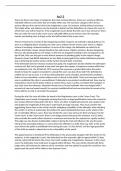There are three main types of categories that rank criminal offences, these are: summary offences,
indictable offences and crimes that are triable either way. The summary category refers to less
serious offences that can be tried in the magistrate's court, for instance, driving without insurance.
The triable either way offences can be deemed as hybrid and the defendant can choose the court in
which their case will be heard in. If the magistrates court decide that the case is too serious for them,
they can refer the case to the crown court. Indictable offences are serious crime (for example,
murder and dealing class A drugs) so the trial will be held at the crown court.
The pre-trial process consists of plea bargaining and bail. Suspects are advised to plead guilty as it is
seen as a mitigating factor meaning once the case is referred to the Crown court, there is a higher
chance of receiving a lowered sentence. In terms of the charge, the defendant can admit to an
offence that holds a lesser charge therefore they will receive a lighter sentence. By plea bargaining
they can also plead guilty to one charge, so the rest are dropped resulting in less consequences. On
top of that, they can also gain a more lenient sentence by pleading guilty to the original charge.
Research shows that BAME defendant are less likely to plead guilty than white defendants primarily
due to believing the justice system will be harsher towards their conviction.
If the defendant however chooses to plead not guilty, the magistrates decide whether the defendant
receives bail. Bail can be granted at any point and gives the suspect a temporary release whilst they
are waiting for trial. The S4 Bail Act 1976 ensures that everyone is granted bail unless the police
decide to keep the suspect remanded in custody.The court can also refuse bail if the defendant is
unlikely to turn up to court, is a risk for obstructing the course of justice, breached bail conditions
before or has committed a serious offence and is a threat to the public. There are two types of bail,
one is conditional the other is unconditional. If defendants are granted conditional bail, they may be
requested to report to the police station at certain times, have a curfew, surrender their passport or
stay clear from any witnesses. Benjamin Mendy was a French footballer who was charged with 5
accounts of rape and sexual assault. He received conditional bail and was instructed to remain at his
home address as well as surrender his passport.
During the trial, the case will either be heard in the Magistrates court or the Crown Court. The
Magistrates court consist of laypeople meaning they have no legal qualifications hence the reason for
less serious offences being dealt with here. There are often 3 magistrates present and a justice clerk
who guides the magistrates if they don’t understand any legal concepts. They must consider the
aggravating (harm done to the victim) and the mitigating (culpability of the offender) when deciding
the verdict. In terms of sentencing, they follow the same standardised process as the whole of the
Uk. In indictable offences cases, they may decide the case is too serious for them and pass it to the
Crown court. In the Crown court, there is one judge present that gives the sentence, and 12 juries
who conclude the verdict (their decision is unanimous and must be the majority for a guilty verdict).
The judge can also dismiss inadmissible evidence during the trial and influence the way the juries
interpret the presented evidence. In cases where the offender is a child, they may refer to the youth
court where the public is prohibited from hearing the case. It is less formal, and the legal guardians
of the child are asked to attend due to the vulnerability of the youth.
The appeal process is introduced if the defendant or the prosecution disagree with the verdict or the
sentence. In the magistrate's court, the defendant has the automatic right to appeal within 21 days
and the retrial will be held in the crown court with a judge and 2 magistrates. However, in the crown
court, the defendant must seek leave to appeal within 28 days. The case will be reheard with three
judges who will evaluate the safeness of the conviction and may uphold or quash the conviction. Any
appeal past this point will be taken to the Supreme Court.





